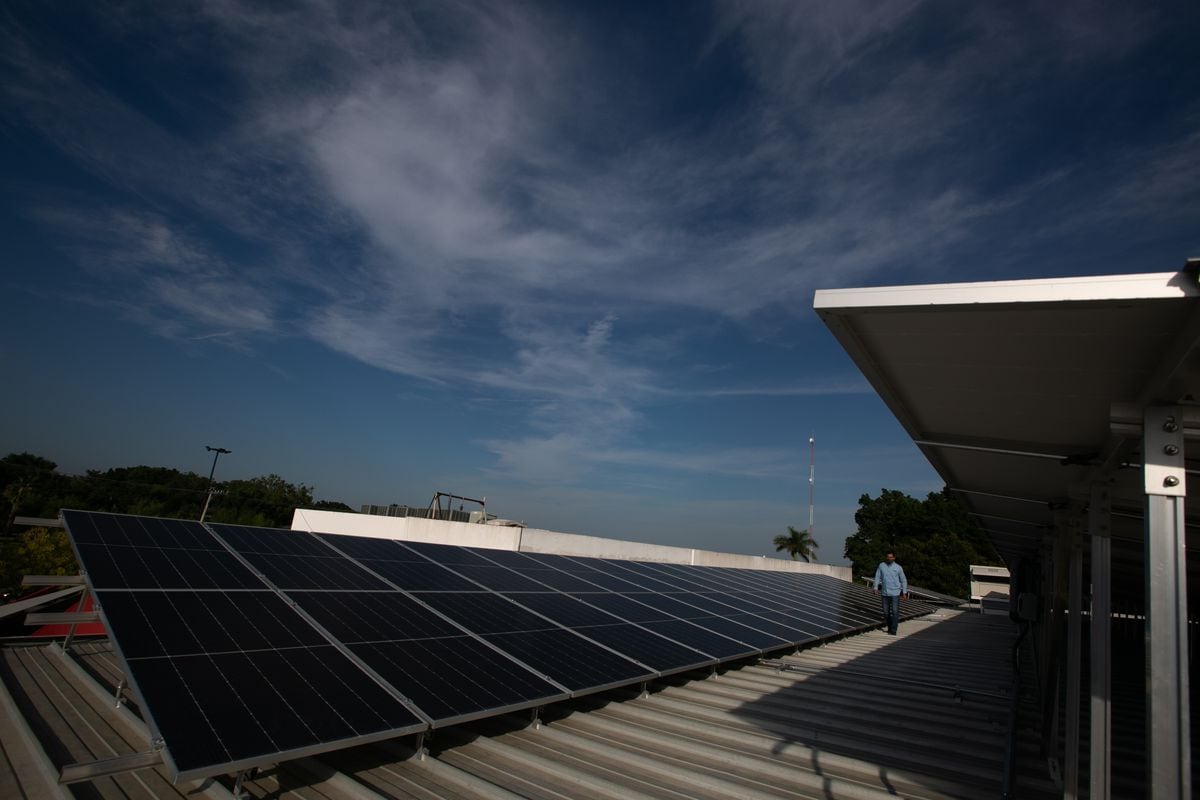Installation on the roof of a swimming school of solar panels carried out by Genergy, a company located in the north of Mexico, in October 2021.Quetzalli Nicte Ha
Years of work by sustainability activists and research groups are beginning to bear fruit.
At least that's what a first study on company practices and investor criteria regarding the environment, social impact and corporate governance that the Organization for Economic Cooperation and Development (OECD) published last week suggests.
One of the findings that surprised its authors: Latin America surpasses China in its advances and is not very far from Europe.
Although not all countries require publicly traded companies to publish an annual sustainability report, companies that represent 83% of the region's market capitalization disclose information on the subject, shows the study that was carried out throughout one year, based on surveys and conversations with companies from Argentina, Brazil, Chile, Colombia, Costa Rica, Mexico and Peru.
Under the umbrella of sustainability there are thorny factors for companies, such as human capital, water management, human and community rights, air quality, and the impact on biodiversity, among others.
“What the big companies told us is that there really was pressure from investors and the general public to make better disclosures and that this has also been their turn,” said Adriana de la Cruz, an OECD public policy analyst. and co-author of the study together with Caio de Oliveira and Lizeth Palencia.
“I think it's the big companies that are raising the bar,” added de la Cruz.
All Latin American countries surveyed require or recommend disclosure of sustainability information by publicly traded companies, although approaches and priorities differ.
Brazil and Colombia have a greater focus on climate-related issues, for example.
In addition, Chile, Colombia, Costa Rica, Mexico, and Peru require or recommend their companies disclose verifiable metrics that allow investors to assess credibility and progress toward meeting an announced sustainability-related goal.
In Latin America, the risks of climate change are more relevant for investors and fund managers than in other regions, being important for 71% of companies by market capitalization (six percentage points above the global figure).
Human capital (55%), waste and wastewater management (46%), and customer data security and privacy (37%) are also key sustainability-related risks identified as economically significant in Latin America .
The region has progress comparable to Europe and is ahead of China, said de Oliveira.
The percentage of companies that publish information on the sustainability of their operations in Latin America is comparable to the rest of the OECD countries, and 60% of them hire an external provider that certifies sustainable practices, a higher proportion than at the national level. global.
“Something that surprised me a lot in Latin America and globally is the number and value of bonds called
sustainability-linked bonds
,” shares de Oliveira.
The most common are green bonds, which are issued to invest in renewable energy projects or that contribute to the energy transition from hydrocarbons to less polluting energies.
These tie the financing to a commitment by the company that the project will be sustainable or meet the requirements of environment, social impact and corporate governance, or ESG, as these criteria are known, for its acronym in English.
“From an economic point of view, it is relatively easy for an executive to promise something to be fulfilled in 10 years, since the executive is going to stay with the company for five years.
So the
sustainability-linked bonds
are a very interesting instrument, because the company has a financial penalty and, in many cases, it conditions the remuneration of the executives.
So, bonds are interesting instruments to increase the credibility of companies”, explains de Oliveira.
In the region, Chile and Mexico have the most active markets, with markets of 14.8 billion dollars and 13 billion dollars, respectively.
And it is precisely the remuneration of the top executives of the companies that emerges as a weak point in the study, both in Latin America and globally.
Only 27% have a performance compensation policy linked to sustainability factors.
Brazil and Colombia stand out with percentages above the average for Latin American countries, according to the report.
The most urgent recommendation that the authors make is that Latin America adopt an international standard to measure sustainability, so that more and better data can be compared.
In addition, there is an information gap for companies that are not listed on the stock market, since they are not accountable to their shareholders.
“The listed companies, it is always true that they are the ones that raise the standards,” says De la Cruz, “hopefully they set the example.
When one thinks about the structures of the company, the companies that are listed have many ramifications, if we take into account all the subsidiaries, groups, companies, etc.
We hope this has a positive ramification”, she adds.






/cloudfront-eu-central-1.images.arcpublishing.com/prisa/D6BPFYE4B5FMJAMYWLMWT3HYGQ.jpg)
/cloudfront-eu-central-1.images.arcpublishing.com/prisa/ETGSMPG4ZNFJFFLVSLKB3DWPSQ.jpg)







